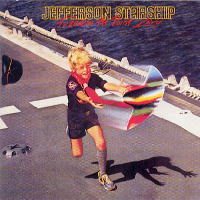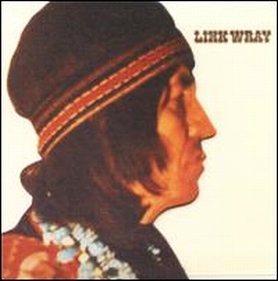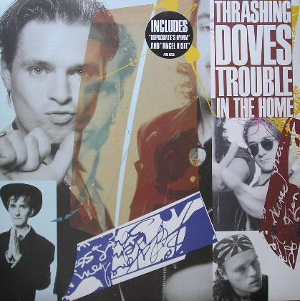
Joseph Kim Mitchell is a Canadian rock musician. He was the lead singer and guitarist for the band Max Webster before going on to a solo career. His 1984 single, "Go for Soda", was his only charted song on the US Billboard Hot 100, reaching number 86. Several other singles such as "Patio Lanterns", "Rock and Roll Duty", and "Rockland Wonderland", reached the top 20 in Canada.

Private Dancer is the fifth solo studio album by American singer Tina Turner. It was released on May 29, 1984 by Capitol Records and was her first album released by the label. After several challenging years of going solo after divorcing Ike Turner, Private Dancer propelled Turner into becoming a viable solo star, as well as one of the most marketable crossover singers in the recording industry. It became a worldwide commercial success, earning multi-platinum certifications, and remains her best-selling album in North America to date.

Norman Jeffrey Healey was a Canadian blues, rock and jazz guitarist, singer and songwriter who attained popularity in the 1980s and 1990s. He reached No. 5 on the U.S. Billboard Hot 100 chart with "Angel Eyes" and reached the Top 10 in Canada with the songs "I Think I Love You Too Much" and "How Long Can a Man Be Strong".

John Kenneth Wetton was an English musician, singer, and songwriter. Although he was left handed, he was known as a dexterous right handed bass player and had a booming baritone voice. He joined the band Family in 1971 for a short time before joining King Crimson in 1972. After the breakup of King Crimson at the end of 1974, Wetton was in progressive rock and hard rock bands including Roxy Music (1974–1975), Uriah Heep (1975–1976), U.K. (1977–1980), and Wishbone Ash (1980–1981).

Chicago VII is the sixth studio album by American rock band Chicago. It was released on March 11, 1974 by Columbia Records. It is notable for being their first double album of new material since 1971's Chicago III and remains their final studio release in that format. It features session percussionist Laudir de Oliveira, who would become a full-fledged band member for the release of Chicago VIII the following year.

Speaking in Tongues is the fifth studio album by the American rock band Talking Heads, released on June 1, 1983, by Sire Records. After their split with producer Brian Eno and a short hiatus, which allowed the individual members to pursue side projects, recording began in 1982. It became the band's commercial breakthrough and produced the band's sole US top-ten hit, "Burning Down the House", which reached No. 9 in the Billboard Chart.

Fight for Love is the fourth album by the Canadian band 54-40, released in 1989. The band supported the album with a Canadian tour.

Too Low for Zero is the seventeenth studio album by English musician Elton John, released in 1983. The album marked a comeback for John, whose previous four albums had failed to yield many enduring international hit singles, and had disappointing sales compared to his string of hit records released during the first half of the 1970s.

Hold an Old Friend's Hand is the second studio album by American singer Tiffany, released on November 21, 1988, by MCA Records. It was produced by George Tobin, who previously worked with Tiffany on her self-titled debut album. Hold an Old Friend's Hand is a teen pop and bubblegum pop album that explores the themes of young adulthood. Musically, the album incorporates elements of pop, rock, funk, disco, dance, and country pop.
King Swamp was a British rock band, consisting of Walter Wray (vocals), Dave Allen (bass), Steve Halliwell (keyboards), Dominic Miller (guitar), and Martyn Barker (drums). The band was formed in 1988 in London, after Allen and Barker had parted ways with Shriekback and recruited Wray as frontman. Halliwell and Mike Cozzi were also ex-Shriekback members.

Freedom at Point Zero is the fifth album by American rock band Jefferson Starship, released in 1979. It was the first album for new lead singer Mickey Thomas, and the first after both Grace Slick and Marty Balin left the previous year. Aynsley Dunbar plays drums on this album; he had left Journey the previous year. The album cover was shot on location in the San Francisco Bay on board the USCGC Midgett.

Lyle Lovett and His Large Band is Lyle Lovett's third album, released in 1989. Lovett won the Grammy Award for Best Male Country Vocal Performance for the album.

Link Wray is the 1971 album by pioneering guitarist Link Wray. The music is an Americana blend of blues, country, gospel, and folk rock elements. This music is characterized by the purposeful use of simplified sounds to reflect the then-current vogue of blues and other roots music being used in many roots rock bands. Wray's guitar-work, composing, and vocals reflected modern rock influences. Despite publicity from radio stations and print media in the Washington, D.C. area, the album did not do well in national sales.

Willow in the Wind is the fifth studio album by American country music artist Kathy Mattea. It was released in 1989 on Mercury Records. The album is her highest-peaking entry on the Top Country Albums charts, where it reached number 6. It was also certified gold by the RIAA. Four singles were released from it, and all four reached Top Ten on the Billboard country singles charts. First were the back-to-back number 1 hits "Come from the Heart" and "Burnin' Old Memories", followed by the number 10 "Where've You Been" and number 2 "She Came from Fort Worth". "Where've You Been" also charted on the Hot Adult Contemporary Tracks charts, peaking at number 25 there. This song also earned her the 1990 Grammy Award for Best Female Country Vocal Performance.

Family Tradition is a studio album by American musician Hank Williams Jr. It was released in April 1979 by Curb Records, his third studio album for the label.

Trouble in the Home is the second album by the English band Thrashing Doves, released in 1989. "Angel Visit" peaked at No. 97 on the UK Singles Chart and No. 14 on Billboard's Modern Rock Tracks chart.

Swamp is the debut and only solo studio album from English songwriter-producer Phil Thornalley, released in 1988 by MCA.

The Good News and the Bad News is the third studio album by the American band the Rainmakers, released in 1989. "Spend It on Love" was released as a single. The band supported the album by touring with the Doobie Brothers.

Tribute to the Music of Bob Wills and the Texas Playboys is the 12th studio album and first tribute album by American country band Asleep at the Wheel. Recorded at studios in Austin, Texas, and Nashville, Tennessee, it was produced by the band's frontman Ray Benson and released on October 25, 1993, by Liberty Records. The collection features recordings of songs made popular by Western swing group Bob Wills and His Texas Playboys, a major influence on Asleep at the Wheel.
Truck was a 1970s Canadian rock group with a musical style similar to Natural Gas and Lighthouse. Signed to the Capitol label, they released two singles and an album. The outfit started out as Sound Spectrum in 1966 and by the early 1970s they had absorbed experienced musicians from groups Natural Gas and Motherlode. Their name had also been changed to Truck! The 1970s lineup was completely different to what it was when the group began. A busy live attraction, they did reasonably well with their album Truck which had an unbroken run for about a month-and-a-half in the charts.

















